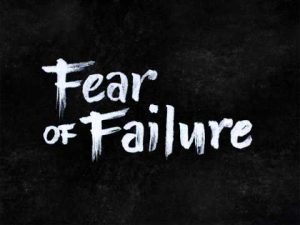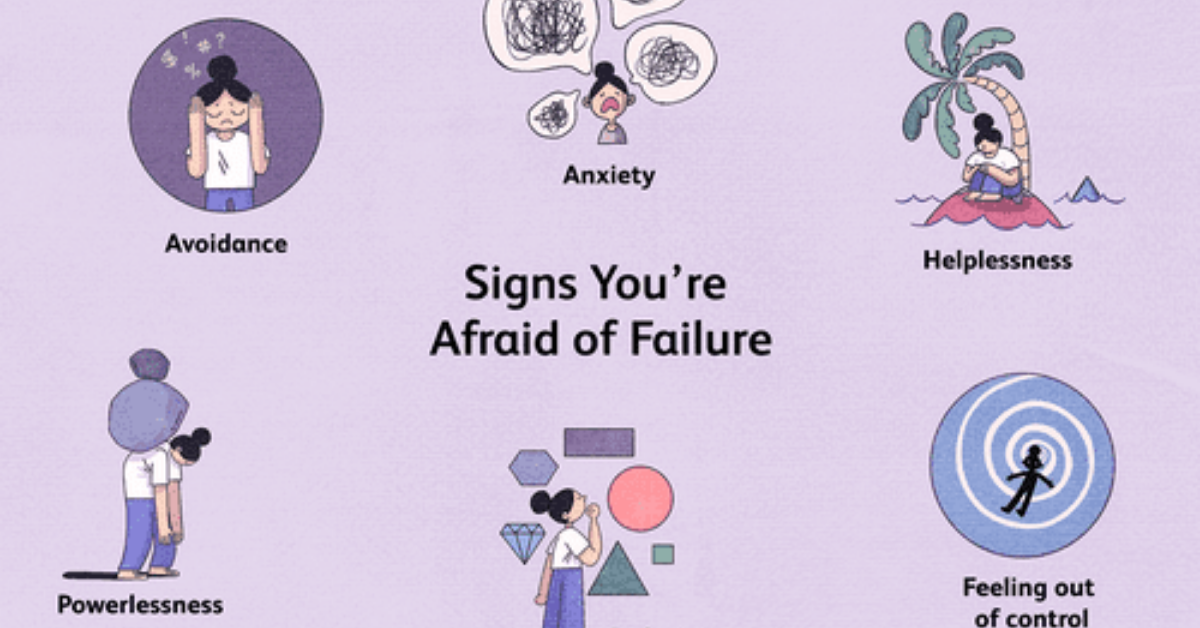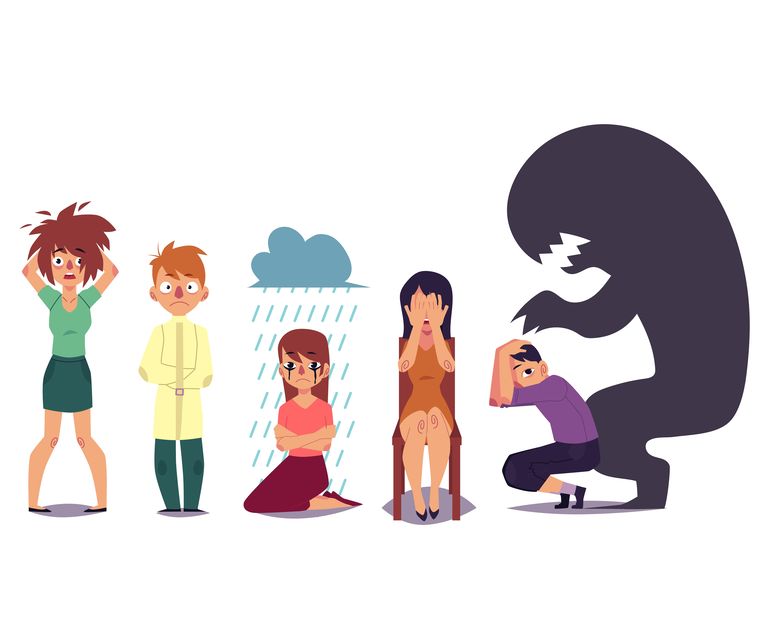Do you have a fear of failure? If so, you’re not alone. Atychiphobia is the fear of failure, and it’s one of the most common phobias in the world. Studies have shown that about 50% of people experience some level of atychiphobia at some point in their lives. While there are different degrees of this fear, it can be debilitating for those who suffer from it. In this blog post, we will discuss what atychiphobia is, its symptoms, and how to overcome it.
Contents
What Is Atychiphobia?
 Atychiphobia is a fear of failure. People who suffer from atychiphobia often experience anxiety and stress when they are faced with any task or situation that has the potential to result in failure. This can lead to difficulty participating in everyday activities and social interactions.
Atychiphobia is a fear of failure. People who suffer from atychiphobia often experience anxiety and stress when they are faced with any task or situation that has the potential to result in failure. This can lead to difficulty participating in everyday activities and social interactions.
People with atychiphobia may avoid trying new things for fear of not succeeding, and they may be overly critical of themselves if they do make a mistake. They may also feel ashamed or embarrassed by their failures, which can further compound feelings of anxiety and distress.
This phobia also means that people with atychiphobia are more likely to give up on tasks prematurely, rather than persevering and giving themselves a chance to succeed.
If you think you may suffer from atychiphobia, it is important to seek help from a mental health professional. There are many treatments available that can help you learn to cope with your fear of failure and live a happier and more productive life.
Signs of Atychiphobia

There are many signs of atychiphobia. Some of these are:
Anxiety
This also includes panic attacks, which can be very frightening and overwhelming. Sometimes it also leads to physical symptoms such as a racing heart, sweating, and feeling lightheaded or dizzy. These symptoms can be very disruptive and can make it difficult to concentrate or focus on anything else.
Insecurity
This means that people with atychiphobia often have low self-esteem and feel like they are not good enough. They may also be very critical of themselves and believe that they are not capable of doing anything right.
Avoidance
People with atychiphobia may avoid trying new things, participating in social activities, or taking risks. This is because they are afraid of not succeeding and embarrassing themselves. They may also feel like they are not good enough or that they don’t deserve to succeed.
Self-Criticism
People with atychiphobia often criticize themselves harshly for any mistakes they make. This can lead to a lot of negative self-talk and feelings of shame and embarrassment. It can also mean that they are less likely to try new things, for fear of not succeeding. Sometimes this leads to a cycle of failure, where people give up on tasks prematurely because they are afraid of not succeeding.
Stress
This also includes physical symptoms such as headaches, muscle tension, and gastrointestinal problems. All of these can be very disruptive and make it difficult to concentrate or focus on anything else.
Difficulty In Breathing
This sign of atychiphobia is often seen in people who have a panic attack. It can be very frightening and overwhelming, and it can make it difficult to breathe properly. Sometimes this can lead to passing out or even death. It can also cause long-term health problems.
Dizziness
This sign also includes feelings of lightheadedness and unsteadiness. When you experience these symptoms, it may be difficult to maintain your balance or stay focused on what you are doing. This can increase your risk of experiencing a fall.
Hot or Cold Flashes
This sign can also be accompanied by feelings of intense heat or coldness. These sensations can come and go suddenly, which can make it difficult to concentrate on anything else.
Chest Pain
This sign may be accompanied by pain in the chest that feels like pressure or tightness. The pain may also spread to the arms, neck, jaw, or back.
Shortness of Breath
This sign is often accompanied by a feeling of breathlessness. You may feel like you are not getting enough air, even when you are resting. This can make it difficult to do everyday activities such as walking or climbing stairs.
Nausea
This sign is often accompanied by a feeling of nausea and vomiting. You may feel like you need to throw up but cannot, or that the feeling will not go away.
Drowsiness
This sign can cause you to feel extremely tired and drowsy. You may find it difficult to keep your eyes open or stay awake. This can increase your risk of an accident if you are driving or operating heavy machinery.
Causes of Atychiphobia

There can be many causes of atychiphobia. Some of these are:
Negative Experiences
People with atychiphobia may have had negative experiences in the past that have made them afraid of failure. This could include being ridiculed or laughed at, being teased or bullied, or experiencing a traumatic event such as a natural disaster or car accident.
Family History
Some people may be more likely to develop atychiphobia if it runs in their family. This is because they may inherit the genes that make them more susceptible to anxiety and fearfulness.
Stressful Life Events
Life events such as moving, getting married, having a baby, or losing a job can be very stressful and can increase your risk of developing atychiphobia. This cause is often called “life stressors.”
Chemical Imbalances In Brain
These also play a role in the development of atychiphobia. People with atychiphobia may have an imbalance of certain chemicals in their brain that make them more prone to anxiety and fearfulness.
Risks Associated With Atychiphobia

There can be many reasons for fearing to fail. It might be that a person has never attempted anything new in their life, or they may have had a traumatic experience with failing at something important.
When someone experiences these symptoms on a regular basis, it can lead to health problems such as anxiety disorders, depression, and even physical health problems such as heart disease. These conditions can be very disruptive and make it difficult for people to live a normal, healthy life.
It is also important to note that when someone avoids trying new things due to their fear of failure, they are not living up to their potential. This means that they are not achieving all that they could be and depriving themselves of the opportunities that come with taking risks.
Triggers of Atychiphobia

There are some triggers of atychiphobia that can cause a person to experience fear and anxiety. These triggers can be things such as:
Making Mistakes
When someone makes a mistake, it can be difficult not to feel anxious about the possibility of making another mistake. This is because they may start to doubt their ability to do anything correctly and worry about the consequences.
Criticism
Receiving criticism can also trigger feelings of fear and anxiety. When someone is criticized, it may make them feel like they are not good enough or that they have failed in some way.
Death
This also can be a trigger for some people. When someone dies, it can make them feel like they are not safe and that anything is possible. It can also lead to feelings of
Watching Other People Fail
Seeing other people fail can also be a trigger for atychiphobia. This is because it may remind someone of their own fears and increase their anxiety levels. It also means that they may start to doubt their ability to succeed.
Rejection
This also can be a trigger for some people. When someone is rejected, it can make them feel like they are not good enough or that they have failed in some way. Sometimes, people may even feel like they are not worthy of love or friendship.
Treatment For Atychiphobia

There are many treatments available for atychiphobia. Some of these include:
Cognitive-Behavioral Therapy
This is a type of therapy that helps people change the thoughts and behaviors that contribute to their fearfulness and anxiety. This type of therapy can be very helpful in treating atychiphobia.
Medication
For some people, medication may also be necessary in order to help treat their atychiphobia. There are a number of different medications that can be prescribed depending on the person’s individual needs. These medications also include antidepressants, which can be helpful in treating anxiety and fearfulness.
Psychotherapy
This is a type of therapy that involves talking with a therapist about your thoughts, feelings, and experiences. This type of therapy can also be very helpful in treating atychiphobia.
Support Groups
There are also support groups available for people who suffer from atychiphobia. In these groups, people can share their experiences and learn from others who have been through the same thing. This can be a very helpful way to get help and support.
Coping-Up With Atychiphobia

There are also some self-help strategies that can be useful for people who suffer from atychiphobia. Some of these include:
Learning How To Relax
This can be done by practicing relaxation techniques such as yoga, meditation, or deep breathing. This also means that you should try to avoid stressors as much as possible.
Challenging Negative Thoughts
When a person experiences fear and anxiety, they may start to have negative thoughts about themselves and their abilities. It is important to challenge these thoughts and replace them with more positive ones.
Facing Your Fears
This means that you should gradually expose yourself to the things that scare you. This can be done by starting with something small and working your way up.
Monitoring Progress
It is also important to keep track of your progress. This can help you see how far you have come and give you encouragement to continue working on your treatment. Sometimes, it can also be helpful to keep a journal to document your progress.
Trying New Things
It is also important to try new things. This can help you expand your horizons and learn new things. It can also help you build confidence in yourself. These also include things that may be challenging for you.
Conclusion
In conclusion, atychiphobia is a fear of failure that can lead to feelings of anxiety, stress, and insecurity. There are many different treatments available for atychiphobia, including cognitive-behavioral therapy, medication, and psychotherapy. There are also support groups available for people who suffer from this condition. Self-help strategies can be useful for people who suffer from atychiphobia. These include learning how to relax, challenging negative thoughts, facing your fears, monitoring progress, and trying new things.
If you or someone you know suffers from atychiphobia and would like more information on treatment options or support groups, please visit our website or contact us today. We would be happy to help.
A Word From Therapy Mantra
Your mental health — your psychological, emotional, and social well-being — has an impact on every aspect of your life. Positive mental health essentially allows you to effectively deal with life’s everyday challenges.
Also, at Therapy Care, we have a team of therapists who provide affordable online therapy to assist you with issues such as depression, anxiety, stress, relationship, OCD, LGBTQ, and PTSD. You can take our mental health test. You can also book a free therapy or download our free Android or iOS app.


